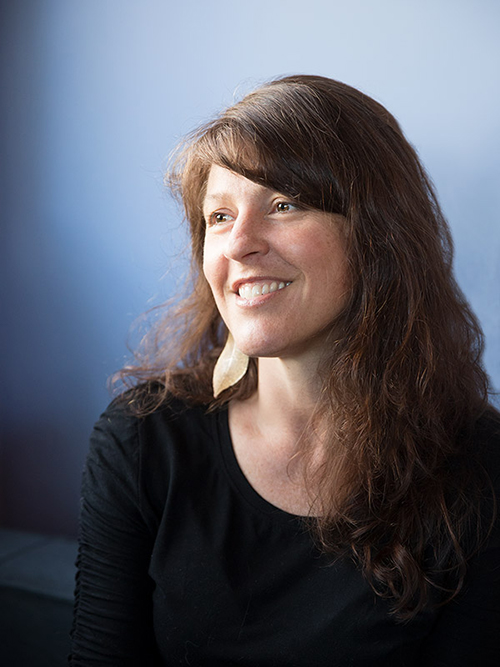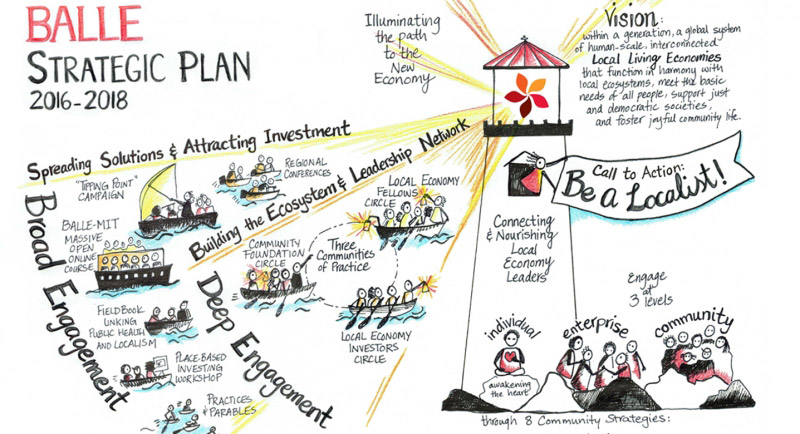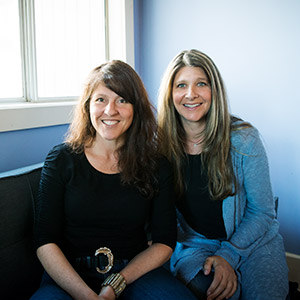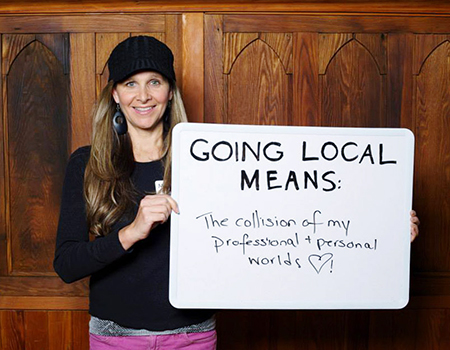
Michelle Long champions localism, local economies and values-driven enterprise as keys to a strong economy
—
It’s the second time in a month that I have the pleasure of being in the audience as Michelle Long, Executive Director of BALLE (Business Alliance for Local Living Economies), delivers the Keynote Speech. It is the second time that she closes her address with raw, unrehearsed emotion and real, honest tears as she implores us to keep love and humanity in our business practices. Before her, is a sea of entrepreneurs, small-business owners, innovators, artists, farmers, alternative healers, artisans, community activists and notable movers and shakers in the worlds of localism, slow money and slow food. It is clear she is moved by her ability to engage and influence a group of people who have the potential to enact positive change. Her gratitude and slight surprise, as if she’s caught off guard by her own power, is charming. Every pair of eyeballs is riveted at the podium, where a petite, brown-haired, bright-faced woman with a wide smile has just brought her audience to their feet.
How does she do it? Michelle possesses a rare combination of passion and humility that is endearing to everyone she meets. She comes from a place of authenticity that projects a deep and profound understanding of the inner workings of humanity — a place at which the rest of us can only strive to arrive.
She does this magical thing where she asks “What if…” questions to get your imagination going, and instantly you are with her as you envision a better world together.
Asking such questions is a tried and true practice for Michelle Long. By asking “What if…” and then imagining the possibilities, Michelle has been able to create and follow a professional path that aligns with her mission to make a difference. A mission that has been the driving force behind her life’s work.
I recently had the opportunity to sit down and talk with Michelle. A day earlier, she had received a standing ovation (and countless hugs) for her keynote speech at a fundraising event for ReThink Local, the BALLE network in New York’s Hudson Valley, for which I was the start-up Outreach Director, and now serve on the Advisory Board. After spending 5 years working in the realm of localism, I view Michelle Long as a personal hero; she’s a true rock star of the new economy, with legions of loyal followers. I felt honored to spend quality time with her, and started my interview by asking her how she got involved with localism.

When Michelle was an MBA student in the ‘90s, she co-founded World2Market, a values-based ecommerce enterprise as a way to enable folks to meet the people behind the products they purchased online. She asked herself, “What if you could see and have a relationship with the people that created the products you bought, enabling you to fully understand how that company’s decisions and policies impacted women/children/the planet? You could then make purchasing choices based on that information, and support those products that had favorable practices aligned with your values.” What is now commonly known as social enterprise — organizations that apply commercial strategies to maximize improvements in human and environmental well-being — was not on most people’s radar when Michelle was starting her company.
She was quite ahead of the times, and her innovative approach to business garnered high praise and significant investment from the venture capital world. As Michelle explains, “It didn’t lead to lots of sales, but we did get lots of attention.” Her company was rewarded with splashy covers on The Wall Street Journal, features on CNN and other news outlets, as well as the notable honor of having then President Bill Clinton make his first ecommerce purchase on her site. However, Michelle quickly saw that her efforts were slow to make significant change with the world issues that she valued.
It became clear to her that local commerce, vs. a global internet company, would be better positioned to connect with customers, and would make for more engaged relationships that ultimately would affect more of the mission-based change Michelle was seeking.
So she closed up shop and started asking more “What if” questions.
At first, Michelle thought she would move somewhere in the world to a small community and make a difference there, but quickly changed her mind. In her modest, self-deprecating style, Michelle asked herself, “Wait, who do I think I am? I don’t even know any other languages!” So she shifted gears and took a look around her community in Washington State, and decided to make a difference in her own backyard. She asked, “What if businesses came together to address what’s happening here at home and focused on what our own community cared about? What if our values could be baked into our businesses and we’d help each other do this?” Michelle hit a nerve. Better, she hit the nail on the head, and found there was a hunger for just such a thing. So she started an organization called Sustainable Connections in Bellingham WA, and set about creating what NPR would eventually dub, the “epicenter of a new economic model.”
At the same time, the first national coalition of values-led businesses called the Social Venture Network was struggling with a common dilemma. Young, socially conscious businesses would take investment dollars they thought they needed to grow bigger to compete head on with business as usual. But in order to pay the investment back, they would potentially have to go public, or even sell their company, often losing the original mission in the process. To combat this, some business leaders within SVN began to identify a need for businesses to stay rooted in a place, be committed to that place, and to be supported by other businesses in that place, all trying to do the same thing. They asked their own “What if…” question:
“What if we had a network of local networks, connected all across the nation, working together, sharing best practices and focusing on local growth and prosperity?”
When Michelle Long was introduced to members of the SVN Board, including Judy Wicks (known as the Mother of Localism), she knew just how to help them with their big vision to create a global network of community networks, and Michelle was put in place as Executive Director of BALLE. She has been in that position for the past 15 years, except for a six-year period when she gave birth to and began to raise her daughter, focusing on making her local network a model during that time. Recently, Michelle helped usher in a leadership shift at BALLE to become a Trio, and Michelle is now one of three leaders. From their website, “The Trio model ensures that our leaders are in distinct and complementary right roles, while operating from consensus to hold the whole, together.” Pam Chaloult runs Operations from the Oakland, CA based headquarters where she heads up the staff, Christine Ageton directs Programming and Strategy, and Michelle is the Vision–Keeper with focus on Outreach.
When I interviewed Michelle, she was in the process of touring individual communities of businesses that share BALLE values (there are now hundreds in north America), and pitching in any way that would best serve the needs of each organization. This includes giving keynote speeches, sitting on expert panels, doing meet-and-greets, and hosting fundraisers. Wherever she goes, she brings along a positive message that includes disseminating hard data (Spoiler alert – Localism is proven effective!), introducing useful parables and spreading stories that matter, and basically serving as a vocal, upbeat ambassador for the localism movement.

Localism is defined on the BALLE website as being “about building communities that are more healthy and sustainable — backed by local economies that are stronger and more resilient. It means we use regional resources to meet our needs – reconnecting eaters with farmers, investors with entrepreneurs, and business owners with the communities and natural places on which they depend. It recognizes that not one of us can do it alone and that we’re all better off, when we’re all better off.” The demonstrated benefits of a vibrant local economy include more wealth and jobs per capita, and greater personal accountability for the health and well-being of the natural and human communities of which we are a part. In her role as BALLE spokesperson, Michelle aims to spread the word on the benefits of taking this place-based approach in the New Economy.
The ‘Taking it to the People’ tour (I called it that in our interview and Michelle liked the ring of it) marks a significant shift from many years of having an Annual BALLE Conference where one or two members of each network would come together for a few days, meet representatives from other networks, and then go back home to share what they learned. “Instead of focusing our energy on one event in one place, this year we’ll be exploring new ways of reaching, connecting, and nourishing local economy leaders and allies in their places.” Although Michelle admits that she always had a “game-changing blast” at the conferences, she values the opportunity to meet so many more people involved in the networks and to immerse herself in the culture and practices that make each network unique.
There has been another significant shift in the BALLE organization, and this one is near and dear to Michelle’s heart. Originally BALLE was set up with a Membership model, or a “pay-to-play” construct. Together, members hoisted the flag of localism and raised awareness about the struggling economy and the challenges facing local businesses. As Michelle tells it, “We were saying, ‘Hey, there’s a problem, but imagine what we can accomplish if we all worked together.’” However, as BALLE grew, their members, like the founders, were mainly white, middle-class businesses whose owners came together to localize their purchasing, to collaborate to make more of what their communities needed, and to use their businesses as a force for community good.
This, Michelle says, was “not the fullness of what needed to happen in order for BALLE to enact significant change toward healthy, equitable local economies.”
We are told by Maggie Anderson, author of Our Black Year, that in her community, ‘buying local’ would be buying from business owners who pulled bars over their shop windows at night and then drove home to their own communities. Without prioritizing a level playing field and expanding ownership and wealth creation in communities of color and places of persistent poverty, we would never see real change. She and the other BALLE leaders decided to identify and follow those who were innovating most in places where the economy had worked the least. These measures included changing the core role of BALLE itself. Michelle describes it as, “We changed from being ‘Consultants’ who guided one form of network along the same path of start-up to development, to becoming more ‘Connectors and Conduits of Information’. We are not the ‘experts’ on everything that works – but we do see the patterns and can align people and communities with resources, tools, and connections.” So, in order to gain broader and deeper engagement, BALLE has shifted their model to one of all-access, and created initiatives which support their goal of creating local economies that work for all.
Two initiatives of which Michelle is most proud are the Local Economy Fellowship Program and the new Well-Being in Business Lab. When asked what the significant takeaways were from each program, Michelle says,
Through the Local Economy Fellowship Program, we learned that there are lots of models that can advance localism, in addition to the network model on which BALLE was originally set up to teach. Examples include micro-enterprise, technical assistance groups, food hubs, social justice organizations, local investment clubs, place-based impact investing and more. We have identified ‘Fellows’ who represent the direction we believe we need to go as a nation and a planet. Each are connecting community networks and working to bring more accountability, personal relationships and compassion to business. We have now identified, connected and nourished leaders from more than 100 communities, and we are telling their stories so that others can see a path forward.
When asked about the purpose behind the Well-Being in Business Lab, Michelle says, “We swim in an invisible sea — we are all a part of a history of oppression and extractive economies – and it is basically embodied in each of us as unconscious behavior. We have to purposefully build awareness of, and transform these habits, if we are actually going to move past our fear, past scarcity, and past the impulse to build bigger walls between each other.” The Well-Being in Business Lab is a profound initiative focused on cultivating connection in business leaders. It is based on the latest in scientific research from the Greater Good Science Center, which finds that regardless of demographics, humans’ well-being derives primarily from four scenarios:
- When we feel connected to our self and our purpose.
- When we feel connected to each other.
- When we feel connected in reverence to the larger natural world.
- When we are being generous.

When asked about the takeaways from this program, Michelle shares that it is just getting started, but a growing number of communities and organizations are joining with BALLE to start their meetings, workdays, retreats, etc., with connection exercises and ‘parables’ — real business stories that are meant to light up our imagination. BALLE provides these and increasingly, communities are coming up with their own. Michelle says, “The world is facing unprecedented challenge — in many ways it is going to get harder. With that knowledge, we see it as our right and even our responsibility to practice and imagine the world that we want so we are better able to innovate from this place in our work, and in our society.” She explains that companies such as Eileen Fisher, and organizations like Etsy.org and Social Venture Institute have already adopted this practice into their culture. “It’s about doing business in a different way — one that takes into account our common humanity,” Michelle explains.
For some, this new way of thinking shatters time-honored, traditional business tenets. Michelle riffs off a list of these as she makes her voice sound deeper and more restricted: “’Business as Usual’, ‘Bigger is better’, ‘Every man for himself’, ’Top of the Pile’, ‘Compete at all costs’, ‘Single bottom line’, ‘What’s in it for me?’” Michelle believes that these old ways of thinking destroy what’s precious on this planet. Naysayers of the localist movement come from a place of fear, and believe that you need to have a cutthroat mentality to succeed and be profitable. But the good news, as Michelle is touring the country to share, is that there is now real, hard data to support just the opposite.
Michelle explains, “After 10-15 years of localist practices in the new economy, there is now research that offers the proof — localism works.
Harvard Business Review, Economic Development Quarterly and other publications are spreading the word that there is indeed a direct correlation between the most jobs and the most wealth for the most people, and the density and diversity of local ownership per place. So, if you want more jobs and more wealth for more people, focus on local ownership. It’s that simple.”
Another critical data point has to do with job creation. Michelle refers to a Small Business Administration study that has researched job creation over the past decade and found that “all net job creation came from businesses with fewer than 20 employees. We are talking about microbusinesses! Despite all the economic development dollars and tax breaks going to big corporations, it is the small businesses that are doing the work of actually growing the economy.”
Finally, Michelle reveals that there is now evidence that when a community welcomes immigrants, their economy grows. “It’s true,” she says, “when a community brings in immigrants, more businesses are started and average incomes rises for everyone.“ For many folks, this information flies in the face of what they think they know to be the case.
As our interview comes to a close, I ask Michelle if she believes it’s our “civic duty” to engage in and support our local communities. I offer to her that I bring house guests out to the shops and restaurants in my town (Woodstock, NY) whenever they visit, infusing my local economy with outside dollars. I also volunteer for local nonprofits, and do my best to support local, independent enterprises over the big box stores, because I want to live where my neighbors share in prosperity. (Clearly I think it is one’s duty.) In a way that is very endearing, she answers me by quoting Abe Lincoln: “I like to see a man proud of the place in which he lives. I like to see a man live so that his place will be proud of him. ” Closing with a parable — true Michelle Long style.

You may also enjoy Interview: Congressman Tim Ryan | America 2.0 with Kristen Noel